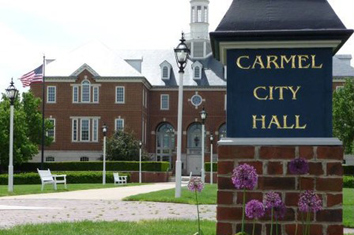Subscriber Benefit
As a subscriber you can listen to articles at work, in the car, or while you work out. Subscribe NowA Marion County judge on Monday granted the city of Carmel a victory in its lawsuit against three financial agencies over a law that diverted local income tax revenue from Carmel to Fishers.
Marion Superior Court Judge John M. T. Chavis ruled that House Enrolled Act 1454, signed into law last year by Gov. Eric Holcomb, is unconstitutional. Carmel argued the law harmed the city by depriving it of tens of millions of dollars in local income tax, or LIT, revenue it would have otherwise received.
Carmel Mayor Sue Finkam said in a written statement that the city would have lost about $56 million in revenue to Fishers through 2026 had the law remained in effect. She said the law “unfairly targeted only one city in the entire state—Carmel.”
“We strive to have cooperative relationships with neighboring cities,” Finkam said. “However, when special laws are passed that overstep legal bounds and harm our community, we will act.”
A Fishers spokesperson on Tuesday said the city had no comment about the decision.
Carmel’s lawsuit filed in July in Marion Superior Court No. 5 named the commissioners of the Indiana Department of Revenue, Indiana Department of Local Government Finance and Office of the Indiana State Auditor (now State Comptroller) as defendants.
The complaint said the defendants were named in the lawsuit because they had a role in carrying out the collection, allocation and distribution of local income taxes to civil taxing units.
In a 17-page decision, Chavis ruled that local income tax shares for the two Hamilton County cities must be allocated as they were before the diversion from Carmel to Fishers began in 2021.
The defendants argued that transferring funds from Carmel to Fishers would foster “unique economic development because of Fishers’ proximity to Interstate 69.” They also argued that Carmel and Fishers “create a single unique class,” justifying a special law because they are the only two second-class cities in Indiana that border a first-class city (Indianapolis).
Chavis disagreed, writing that Carmel and Fishers’ proximity to Indianapolis “does not establish the need for Carmel’s LIT funding to be capped so that funds Carmel would have been entitled to receive under the General Formula could be diverted to Fishers to foster economic development along I-69, which has passed through Fishers for decades.”
He also noted that Noblesville borders Fishers on the Interstate 69 corridor, so being a Hamilton County city bordering Fishers is not unique and it does not justify a special law.
Chavis wrote that the law had two key parts: It directed additional LIT revenue to Fishers on top of the revenue it already receives under the LIT formula, and it provided Fishers with the funds from a single source.
Carmel bore 100% of the burden “because the Fishers Transfer caps Carmel’s (and only Carmel’s) LIT Distribution under the General Formula and gives Fishers everything over that cap—a total transfer of approximately $56 million.”
“[T]his special law not only treats Carmel and Fishers differently than the rest of Indiana, it also treats them differently than each other,” Chavis wrote. “That sort of special treatment is unconstitutional unless some characteristic unique to Carmel and Fishers justifies it.”
House Bill 1113, passed by the Indiana Legislature in 2020, limited Carmel to a 2.5% increase in annual income tax growth for three years and diverted excess funds to Fishers.
The legislation’s goal was to account for a quirk in the way income taxes are distributed so the revenue more accurately reflects the cities’ increasingly similar populations and median household incomes.
The law was set to expire at the end of 2023. However, legislators last year passed HEA 1454, which extended the law through 2026.
Local income tax revenue distributions are typically placed in a pot and distributed to local governments in accordance with a state-mandated formula, one that considers each community’s property tax levy and the amount of income taxes the city received the previous year.
Under the original legislation, the state capped the year-over-year growth of Carmel’s tax revenue allocation at 2.5% from 2021 through 2023.
Carmel’s lawsuit said that, before the law, Carmel historically received about 42% of income taxes collected and distributed to cities in Hamilton County while having 34% of the county’s population. Fishers received 23% of income taxes while having 32% of Hamilton County’s population.
The complaint said Carmel lost $16.7 million to Fishers after House Bill 1113 was enacted, rather than the estimated $10.2 million. It also estimated Carmel stood to lose more than $39 million through 2026 because of the extension.
The lawsuit claimed HEA 1454 punished Carmel for taking on the risk of building additional “costly infrastructure that others, including Fishers, chose to not invest in.”
It added that Carmel invested millions of dollars in infrastructure by issuing bonds in reliance on the general local income tax allocation formula and attracted a greater amount of assessed value in the form of office buildings and corporate headquarters.
Please enable JavaScript to view this content.

